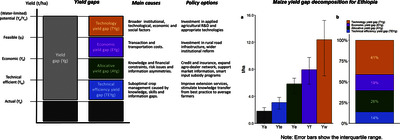van Dijk, M.  ORCID: https://orcid.org/0000-0002-5207-7304, Morley, T., van Loon, M., Reidsma, P., Tesfaye, K., & van Ittersum, M.K.
(2020).
Reducing the maize yield gap in Ethiopia: Decomposition and policy simulation.
Agricultural Systems 183 e102828. 10.1016/j.agsy.2020.102828.
ORCID: https://orcid.org/0000-0002-5207-7304, Morley, T., van Loon, M., Reidsma, P., Tesfaye, K., & van Ittersum, M.K.
(2020).
Reducing the maize yield gap in Ethiopia: Decomposition and policy simulation.
Agricultural Systems 183 e102828. 10.1016/j.agsy.2020.102828.
Preview |
Text
1-s2.0-S0308521X19314490-main.pdf - Published Version Available under License Creative Commons Attribution. Download (1MB) | Preview |
![1-s2.0-S0308521X19314490-ga1_lrg.jpg [thumbnail of 1-s2.0-S0308521X19314490-ga1_lrg.jpg]](https://pure.iiasa.ac.at/16473/7.hassmallThumbnailVersion/1-s2.0-S0308521X19314490-ga1_lrg.jpg)  Preview |
Image
1-s2.0-S0308521X19314490-ga1_lrg.jpg - Graphical Abstract Available under License Creative Commons Attribution. Download (279kB) | Preview |
Abstract
Maize is an important staple crop in Ethiopia. Reducing the yield gap - the difference between actual and (water-limited) potential yield - has wide implications for food security and policy. In this paper we combine stochastic frontier analysis of household survey data with agronomic information on (water-limited) potential yield to decompose the maize yield gap in Ethiopia and highlight policy solutions to reduce the yield gap. Our analysis suggests that lack of access to advanced technologies makes up the largest component of the maize yield gap but market imperfections, economic constraints and management constraints are also important determinants. Potentially, maize production can be increased almost fivefold if all these constraints would be addressed simultaneously and the yield gap could be fully closed. Another finding of the paper is measurement issues in the national household survey (LSMS-ISA), a key source of information for scientists to assess agricultural policies in Ethiopia and other African countries. A comparison with results from a crop model suggests a large number of unrealistic values related to key maize input and output variables. Combining economic and agronomic approaches is therefore not only useful to identify policies to reduce maize yield gaps, but also to assess and improve the quality of data-bases on which recommendations are made.
| Item Type: | Article |
|---|---|
| Research Programs: | Ecosystems Services and Management (ESM) |
| Depositing User: | Luke Kirwan |
| Date Deposited: | 17 May 2020 12:39 |
| Last Modified: | 28 Aug 2024 08:08 |
| URI: | https://pure.iiasa.ac.at/16473 |
Actions (login required)
 |
View Item |
 Tools
Tools Tools
Tools